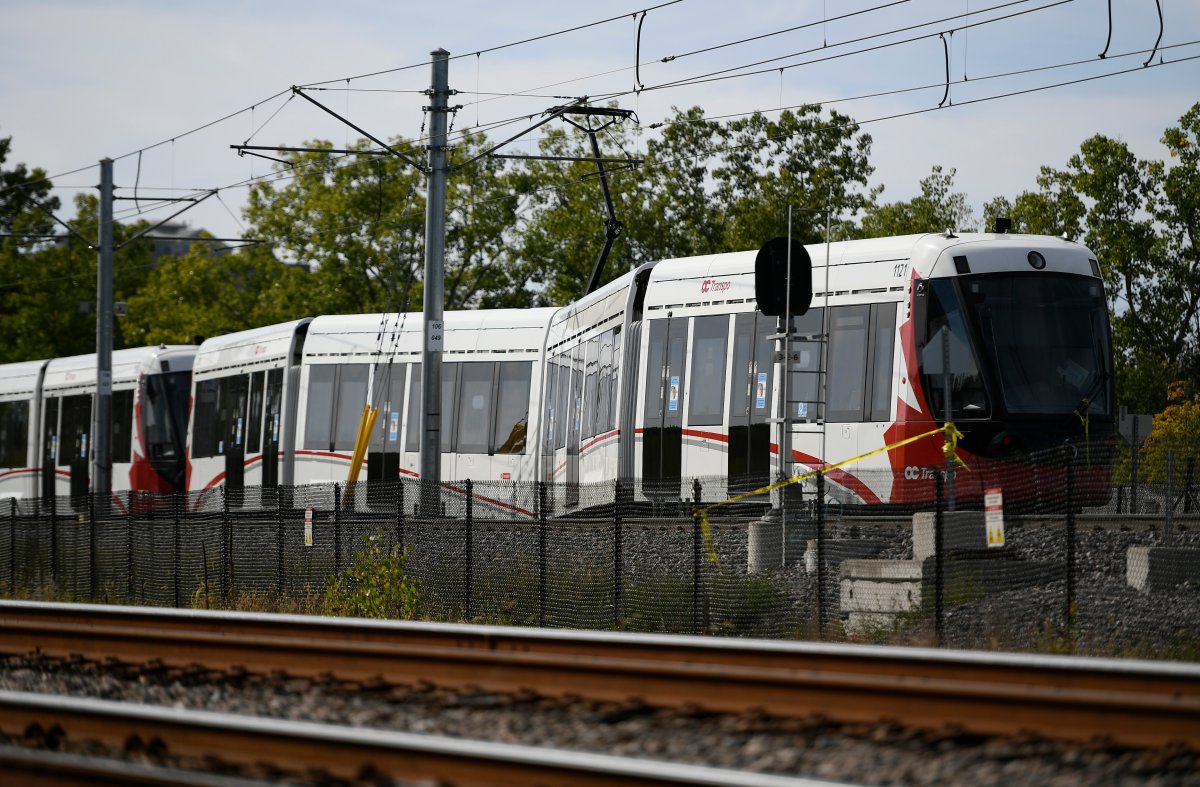Ottawa’s hired rail safety experts pointed to workflow shortfalls as the biggest ongoing concern with the troubled Confederation Line on Friday as some light-rail trains were taken out of a testing exercise earlier this week for “vibration” issues.

Representatives from Transportation Resource Associates (TRA), Ottawa’s independent rail safety advisor, joined city staff to brief members of council and the transit commission Friday on a return-to-service plan for the troubled Confederation Line LRT.
“Vibration” issues on some of the vehicles led to five trains being pulled from testing as Rideau Transit Group simulated partial service of seven trains on the line Thursday, councillors and commissioners heard.
Two of those trains have already been cleared to return to testing while three others are pending validation, Ottawa’s chief safety officer Brandon Richards told media after the briefing.
Richards said those vibrations were happening when trains go around curves in the track, as an example.
“It’s something that we’re taking very seriously to make sure that the vehicles are safe to continue in testing before we go into service,” he said.
A firm date has not been given for when the Confederation Line will welcome passengers back, though Mayor Jim Watson said Friday that staff “remain confident” the LRT service will resume in the first two weeks of November.
A date will be given “a day or two” before the line reopens, he said.
TRA is overseeing the testing and will need to give its final sign-off before the line can reopen.

The Confederation Line has been out of service for 47 days as of Friday, following a derailment in mid-September.
The Transportation Safety Board of Canada (TSB) released a letter Thursday afternoon that blamed “inconsistent and incomplete maintenance” on the line as the primary cause of September’s derailment.
A set of bolts on a motor gearbox was not properly tightened during the train’s refurbishment, the TSB report indicated.
TRA representatives said Friday that its assessment of the derailment aligns with the TSB’s findings.
Councillors not confident in LRT
Much of TRA’s analysis and councillor and commissioner questions during Friday’s briefing focused around the competency of RTG and its subcontractors, namely trainmaker Alstom, in providing robust maintenance service.
TRA president Kenneth Korach said the gaps in oversight that led to the Sept. 19 derailment likely aren’t malicious in nature, but the result of lapses in procedure that become commonplace over time.
“People take shortcuts, and then they take more and more shortcuts, and pretty soon the standard becomes, ‘This is how we do business,’” he said.
While TRA’s reps seemed confident that Alstom and RTG were in agreement about where improvements need to be made and could shape up, many councillors and commissioners in attendance were not convinced that the LRT team’s performance will improve once the consultant is gone.
“I’m not coming out of this with any more confidence than I came into it,” Somerset Coun. Catherine McKenney said Friday, adding that adequate maintenance protocols should’ve been in place from day one — not improve solely when TRA is in the city to “hold them against the wall.”
- ‘Shock and disbelief’ after Manitoba school trustee’s Indigenous comments
- ‘Super lice’ are becoming more resistant to chemical shampoos. What to use instead
- Is home ownership only for the rich now? 80% say yes in new poll
- Invasive strep: ‘Don’t wait’ to seek care, N.S. woman warns on long road to recovery
McKenney expressed frustration with the structure of the city’s deal with RTG that doesn’t give it direct enough oversight over the daily processes of running and maintaining the line.
Some councillors have suggested that the upkeep work should be brought in-house and the city’s 30-year maintenance contract with the construction consortium be torn up.
ATU 279, the union representing the bulk of Ottawa transit workers, released a statement shortly after the end of Friday’s technical briefing calling for an end to the public-private partnership and suggesting transparency into the line’s issues would improve if maintenance were done in-house.
But city manager Steve Kanellakos shot back at those suggestions speaking to media after the briefing on Friday.
“The path forward is not to take it in-house,” he said. “It’s a very simplistic argument and position for people to be taking based on the contractual reality we have with RTG.”
Kanellakos said councillors have been briefed in-camera about the complexity of tearing up the city’s contract with RTG, and stood by the oversight and dispute resolution procedures in the original project agreement.
The city is currently trying to resolve disputes with its rail partner surrounding a second notice of default served to the consortium after the September derailment, a notice RTG disputed.
Kanellakos said Friday that those discussions are still contained within the bounds of the project agreement at the moment and has not yet escalated to court.





Comments